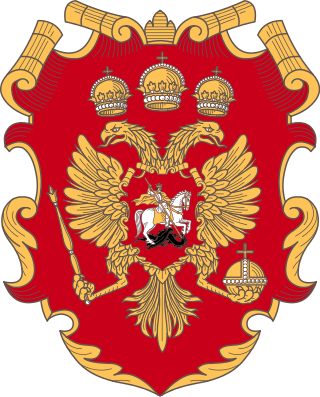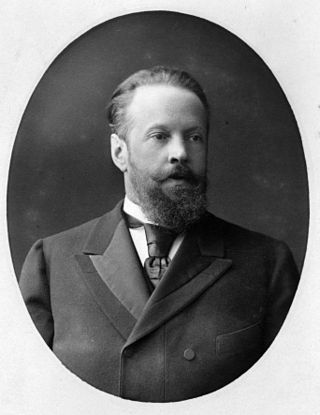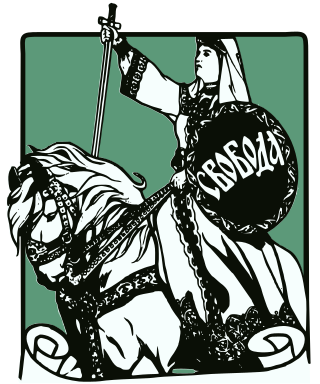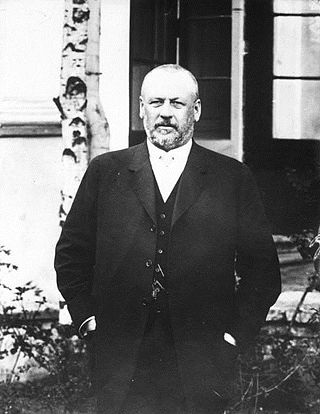Related Research Articles

The Zemsky Sobor was a parliament of the Tsardom of Russia's estates of the realm active during the 16th and 17th centuries.

Count Sergei Yulyevich Witte, also known as Sergius Witte, was a Russian statesman who served as the first prime minister of the Russian Empire, replacing the emperor as head of government. Neither liberal nor conservative, he attracted foreign capital to boost Russia's industrialization. Witte's strategy was to avoid the danger of wars.

Pyotr Arkadyevich Stolypin was a Russian statesman who served as the third prime minister and the interior minister of the Russian Empire from 1906 until his assassination in 1911. Known as the greatest reformer of Russian society and economy, his reforms caused unprecedented growth of the Russian state, which was halted by his assassination.

A zemstvo was an institution of local government set up during the emancipation reform of 1861 carried out in Imperial Russia by Emperor Alexander II of Russia. Nikolay Milyutin elaborated the idea of the zemstvo, and the first zemstvo laws went into effect in 1864. After the October Revolution the zemstvo system was shut down by the Bolsheviks and replaced with a multilevel system of workers' and peasants' councils ("soviets").

Pavel Nikolayevich Milyukov was a Russian historian and liberal politician. Milyukov was the founder, leader, and the most prominent member of the Constitutional Democratic party. He changed his view on the monarchy between 1905 and 1917. In the Russian Provisional Government, he served as Foreign Minister, working to prevent Russia's exit from the First World War.

The Constitutional Democratic Party, also called Constitutional Democrats and formally the Party of People's Freedom, was a political party in the Russian Empire that promoted Western constitutional monarchy—among other policies—and attracted a base ranging from moderate conservatives to mild socialists. Party members were called Kadets from the abbreviation K-D of the party name. Konstantin Kavelin's and Boris Chicherin's writings formed the theoretical basis of the party's platform. Historian Pavel Miliukov was the party's leader throughout its existence.

Prince Georgy Yevgenyevich Lvov was a Russian aristocrat, statesman and the first prime minister of the Russian Republic from 15 March to 20 July 1917. As Russia's de facto head of state, he led the Provisional Government after the February Revolution led to the abolition of the Russian monarchy.

Baron Boris Vladimirovich Shturmer was a Russian lawyer, a Master of Ceremonies at the Russian Court, and a district governor. He became a member of the Russian Assembly and served as prime minister in 1916. A confidant of the Empress Alexandra, under his administration the country suffered drastic inflation and a transportation breakdown, which led to severe food shortages. Stürmer simply let matters drift until he was able to be relieved of this post. He was during the course of his career Minister of Internal Affairs and Foreign Minister of the Russian Empire.

The Union of the Russian People (URP) was a loyalist far-right nationalist political party, the most important among Black-Hundredist monarchist political organizations in the Russian Empire between 1905 and 1917. Since 2005, organizational cells of the Union have been undergoing a revival in Russia and Ukraine.
The Russian Council of Ministers is an executive governmental council that brings together the principal officers of the Executive Branch of the Russian government. This includes the chairman of the government and ministers of federal government departments.

Mikhail Vladimirovich Rodzianko was a Russian statesman of Ukrainian origin. Known for his colorful language and conservative politics, he was the State Councillor and chamberlain of the Imperial family, Chairman of the State Duma and one of the leaders of the February Revolution of 1917, during which he headed the Provisional Committee of the State Duma. He was a key figure in the events that led to the abdication of Nicholas II of Russia on 15 March 1917.

Prince Pyotr Dmitrievich Svyatopolk-Mirsky was a Russian general, politician, and police official.

Alexander Ivanovich Guchkov was a Russian politician, Chairman of the Third Duma and Minister of War in the Russian Provisional Government.

Vasily Alekseyevich Maklakov was a Russian student activist, a trial lawyer and liberal parliamentary deputy, an orator, and one of the leaders of the Constitutional Democratic Party, notable for his advocacy of a constitutional Russian state. He served as deputy in the (radical) Second, and conservative Third and Fourth State Duma. According to Stephen F. Williams Maklakov is "an inviting lens to which to view at the last years of Tsarism".

The State Duma, also known as the Imperial Duma, was the lower house of the legislature in the Russian Empire, while the upper house was the State Council. It held its meetings in the Tauride Palace in Saint Petersburg. It convened four times between 27 April 1906 and the collapse of the empire in February 1917. The first and the second dumas were more democratic and represented a greater number of national types than their successors. The third duma was dominated by gentry, landowners, and businessmen. The fourth duma held five sessions; it existed until 2 March 1917, and was formally dissolved on 6 October 1917.

The Vyborg Manifesto ; also called the Vyborg Appeal) was a proclamation signed by several Russian politicians, primarily Kadets and Trudoviks) of the dissolved First Duma on 22 July [O.S. 9 July] 1906.

Dmitry Nikolaevich Shipov was a Russian liberal Slavophile politician of the 19th and 20th centuries.

The Romanov Tercentenary was a country-wide celebration, marked in the Russian Empire from February 1913, in celebration of the ruling House of Romanov. After a grand display of wealth and power in St. Petersburg, and a week of receptions at the Winter Palace, the imperial family embarked on a tour following Mikhail I Romanov's route after he was elected tsar by the Zemsky Sobor of 1613, a sort of pilgrimage to the towns of ancient Muscovy associated with the Romanov dynasty, in May.

Beseda was a clandestine discussion circle consisting of liberal "zemstvo men", among them prominent and grand names of the Russian aristocracy. The intelligentsia discussion group was formed in the wake of resumed persecution of the zemstvos after increased liberties during the Russian famine of 1891–92.
United Nobility was a union active in the Russian Empire from 1906 to 1917. The union consisted of the Russian nobility and gentry. United Nobility was one of several landowners' organisations which were established in the wake of the Russian Peasants' uprising of 1905–1906, and the largest estates joined these groups as a part of a larger "gentry reaction" to the violence directed towards Russian squires. Its leader was Count Aleksei Bobrinsky, brother-in-law of later Prime Minister Georgy Lvov. It was established to defend the property rights and the domination in local politics of the gentry.